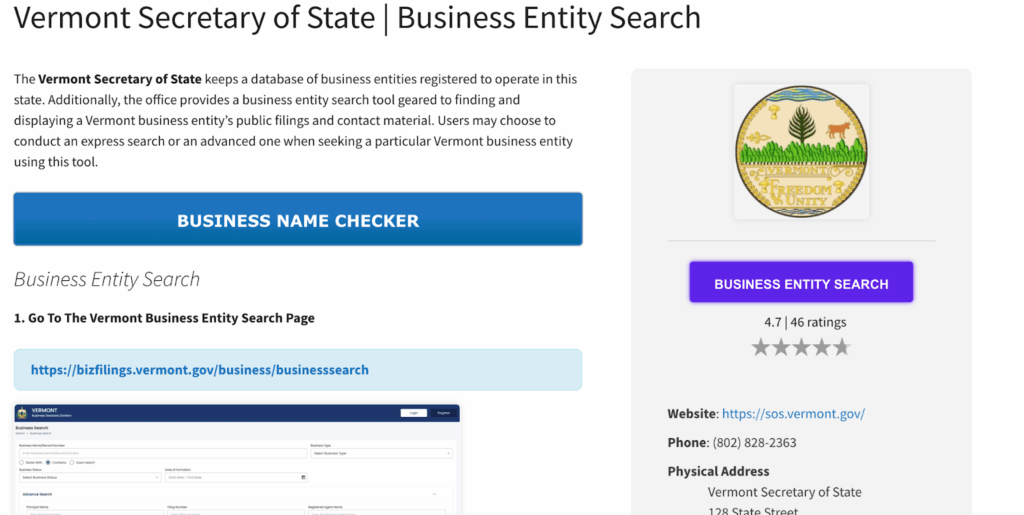Starting a business in Vermont or researching existing companies requires access to reliable business intelligence. The Vermont business entity search system, operated by the Secretary of State’s Corporations Division, provides free access to comprehensive information about registered businesses throughout the Green Mountain State. Whether you need to verify name availability, check business compliance status, or conduct due diligence on potential partners, this official database serves as your essential resource for business decision-making.
Our step-by-step guide will walk you through the entire process of conducting effective Vermont entity searches. You’ll learn to navigate the official database, understand search results, resolve common issues, and take appropriate action based on your findings.
What is a Vermont Business Entity Search?
A Vermont business entity search is a free online database tool provided by the Vermont Secretary of State’s Corporations Division that allows users to access public records and filing information for businesses registered within the state. The Vermont Secretary of State’s Business Entity Search tool is the official database for all registered business entities in Vermont. This online portal allows users to search for information about businesses registered with the state, including LLCs, corporations, partnerships, and nonprofits.
This official database serves as the authoritative source for business entity information in Vermont, enabling users to locate and verify information about various types of business structures, including corporations, limited liability companies (LLCs), limited partnerships, and other registered business entities.
The primary purposes of conducting a Vermont business entity search include:
- Name availability verification – Confirming your desired business name isn’t already registered by another entity in Vermont
- Business status confirmation – Determining whether a company maintains active status, has been dissolved, or faces compliance issues
- Due diligence research – Investigating potential business partners, competitors, vendors, or acquisition targets
- Compliance verification – Ensuring businesses meet their regulatory obligations and maintain good standing with state authorities
Importance of Conducting a Vermont Entity Search
Performing thorough entity searches in Vermont delivers substantial value across numerous business scenarios, protecting your interests while ensuring compliance with state regulations.
Checking Name Availability
Before finalizing a business name, conducting a Vermont business entity search helps you avoid expensive legal conflicts and formation document rejections. Vermont law requires business names to be distinguishable from existing registered entities, making name verification essential for successful business formation. The search reveals whether your proposed name is already in use and identifies potential conflicts.
Due Diligence & Risk Mitigation
Entity searches provide critical intelligence for evaluating potential business partners, competitors, and acquisition targets. You can verify legal status, review compliance history, and assess operational stability before entering partnerships. This research helps identify red flags such as suspended entities or patterns of non-compliance.
Legal Compliance
Regular entity searches help monitor your business’s standing and identify compliance issues requiring attention. This proactive approach prevents penalties and maintains a good standing status necessary for legal operations.
Types of Business Entities in Vermont
Vermont’s business entity search database contains comprehensive information about various business structures registered within the state, each offering distinct advantages for different business needs.
- Corporation: Traditional structure providing strong liability protection and facilitating investment through stock issuance. Ideal for businesses planning substantial growth or seeking outside investors.
- Limited Liability Company (LLC): Flexible entity combining liability protection with operational simplicity and favorable tax treatment. Popular among small to medium businesses seeking protection without extensive formalities.
- Limited Partnership (LP): Features general partners with management authority and unlimited liability, plus limited partners with investment roles and liability protection. Used for real estate ventures and investment projects.
- Limited Liability Partnership (LLP): Professional service entity providing liability protection while maintaining partnership taxation benefits. Utilized by attorneys, accountants, and licensed professionals.
- Nonprofit Corporation: A tax-exempt organization for charitable, educational, or public benefit purposes. Must comply with specific requirements to maintain tax-exempt status.
- Professional Corporation (PC): A Specialized structure for licensed professionals like doctors and lawyers, providing liability protection while meeting professional licensing requirements.
How to Perform a Vermont Business Entity Search
Conducting a comprehensive Vermont business entity search requires following specific procedures to access the official database and retrieve accurate, current information about registered businesses.
Step 1: Visit the Vermont Secretary of State Website
Navigate to the Vermont Secretary of State’s Corporations Division website. The official search portal provides free public access to the comprehensive business entity database maintained by the Vermont Secretary of State’s office.

Step 2: Select Search Type
The Vermont Secretary of State business entity search offers multiple search options to accommodate different research needs and available information:
- Business Name Search: Enter the business name or record number into the first text box. Then, locate the radio buttons below the text box, and describe the search item placement in the Vermont business entity’s name field. This option allows you to search for complete or partial business names and supports various search parameters, including “starts with,” “exact match,” or “contains” options for precise results.
- Entity ID Search: Input the specific Vermont entity identification number to access detailed information about a particular business when you know the exact entity number from previous research or official documentation.
- Officer Search: Search by officer or registered agent name to find entities associated with specific individuals, enabling you to identify businesses sharing common representation or management.
Step 3: Review Search Results
After submitting your search criteria, the system displays a comprehensive results list showing matching entities with essential identifying information, including entity name, ID number, entity type, status, and formation date. Carefully review all results, as similar names, abbreviations, or slight variations may appear in the listing.
Click on individual entity names to access detailed information pages containing complete business data, including formation dates, registered offices, current status, and complete filing history with the Secretary of State.
Step 4: Request Official Documents (optional)
For official purposes such as loan applications, legal proceedings, or regulatory compliance, you can request certified copies of business formation documents, annual reports, and other official filings through the Vermont Secretary of State’s document services. Processing times and fees vary based on document type and delivery method preferences.
Understanding Vermont Entity Search Results
Interpreting Vermont business entity search results requires understanding various status designations and their practical implications for business operations, compliance, and legal standing.
- Active: The entity maintains good standing with the state, has filed all required reports and fees, and remains fully compliant with regulatory obligations. Active entities can conduct business legally and maintain all operational privileges throughout Vermont.
- Inactive: The business has ceased active operations or failed to maintain required filings, though formal dissolution procedures have not been completed. Inactive entities cannot conduct business legally and may face penalties or administrative dissolution.
- Revoked: The Secretary of State has revoked the entity’s charter due to serious non-compliance with filing requirements, fee payments, or regulatory violations. Revoked entities lose all legal authority to operate and must complete reinstatement procedures to resume business activities.
- Dissolved: The entity has completed formal dissolution procedures according to Vermont law, effectively ending its legal existence. Dissolved businesses cannot conduct operations and cannot be reinstated without forming entirely new entities.
- Forfeited: The entity has lost good standing due to failure to pay required fees, file mandatory reports, or maintain other compliance obligations with state authorities. Forfeited entities cannot legally operate until they complete reinstatement procedures.
- Merged: The entity has been absorbed into another business entity through formal merger procedures, with the surviving entity continuing operations under its original or modified corporate structure.
- Converted: The business has changed its entity type while maintaining continuous legal existence, such as converting from a corporation to an LLC or modifying its registration status within Vermont.
Common Issues with Vermont Business Entity Searches
Even experienced users encounter challenges when conducting Vermont business entity searches, but understanding common problems and their solutions ensures more successful research outcomes.
- Name Variations and Spelling Differences: Businesses may be registered with slight variations in spelling, punctuation, or abbreviations that don’t match your search terms. Try multiple search approaches, including partial name searches and testing different formats. For example, if searching for “Green Mountain Consulting,” first conduct an “exact match” search, then try broader parameters using “contains” or “starts with” options.
- Limited Ownership Information: Vermont’s public database provides basic entity information but limited ownership details for privacy protection. For comprehensive ownership research, you may need to review annual reports or contact the Secretary of State directly for additional information.
- Recent Filings Not Immediately Reflected: New documents may take 24-48 hours or longer to appear in the database. When you file online, the clerk processes your documents within 1 business day. Processing time for mailed-in Articles of Organization is 2 – 3 weeks. Allow adequate time when searching for recently formed entities.
- Technical or Browser Issues: Some users experience compatibility problems with older browsers or disabled JavaScript. Ensure your browser supports current web standards, clear cookies if experiencing errors, and try alternative browsers if problems persist.
- Incomplete Information: Public records may not contain all desired information due to privacy restrictions or incomplete filings. Consider supplementing research with additional sources such as professional databases or legal counsel consultation.
Steps After Completing Your Vermont Entity Search
Your search results determine appropriate next steps based on whether you’re forming a new business or researching existing entities.
For New Businesses
- Name Reservation Process: If your desired name is available, consider reserving it through the Vermont Secretary of State’s name reservation system. The Vermont Secretary of State allows for business name reservation for 120 days by filing a Name Reservation application; the fee is usually $20.
- Formation Document Filing: Proceed with filing your Articles of Incorporation, Articles of Organization, or other required documents. The initial Vermont LLC filing fee for the Articles of Organization $125 or $155, depending on circumstances. Corporation fees may vary based on authorized shares.
- Tax Registration Steps: Register with the Vermont Department of Taxes for state tax obligations and obtain federal tax identification numbers. All entities must comply with tax requirements based on their business type and activities.
- License Acquisition Needs: Research and obtain required business licenses or permits specific to your industry and operational locations within Vermont.
For Existing Businesses
- Document Acquisition Processes: Obtain certified copies of corporate documents through the Secretary of State’s document services. These official documents are required for banking, lending, and legal proceedings.
- Annual Report Requirements: The report is due annually by March 15 and must be submitted online through the Vermont Secretary of State’s website. There is a $35 filing fee at the time of submission. However, some sources indicate that The Vermont LLC Annual Report costs $45 per year.
- Reinstatement Procedures: If your entity shows non-compliant status, contact the Secretary of State to understand reinstatement requirements, which typically involve paying outstanding fees and filing delinquent reports.
- Ongoing Compliance Maintenance: Establish systems for tracking filing deadlines and fee payments to maintain good standing and avoid compliance issues.
Simplify Your Vermont Business Setup with Commenda
Navigating Vermont’s business formation and compliance requirements can be complex for busy entrepreneurs. Commenda streamlines the process by providing comprehensive entity management solutions that eliminate pitfalls and ensure ongoing compliance with state requirements.
Our platform automates deadline tracking, manages required filings, and provides expert guidance throughout the business lifecycle. Vermont businesses can focus on revenue-generating activities while maintaining perfect compliance records and avoiding costly penalties. Book a free demo with Commenda today to learn more.
FAQs on Vermont Business Entity Search
Q: How do I verify if my chosen business name is available in Vermont?
A: Use the Vermont Secretary of State’s entity search with the exact match option. If no results appear, also try “contains” and “starts with” to catch similar names.
Q: Can I reserve a business name in Vermont after my entity search?
A: Yes. You can reserve an available name through the Secretary of State’s system, which holds it while you complete your formation paperwork.
Q: What does it mean if a business entity in Vermont is listed as “forfeited”?
A: “Forfeited” means the business lost good standing by failing to pay fees, file reports, or meet compliance rules. It cannot operate until reinstated.
Q: How frequently is the Vermont business entity database updated?
A: Online filings usually appear within 24–48 hours. Paper filings may take longer to process.
Q: Can sole proprietorships be found through Vermont’s entity search tool?
A: No. Sole proprietorships are not registered with the Secretary of State. Only corporations, LLCs, and partnerships appear in the database.
Q: Are official business documents available directly via Vermont’s entity search platform?
A: Certified copies must be requested separately from the Secretary of State’s office for a fee.
Q: Why might my Vermont entity search return no results for an existing business?
A: Reasons include operating as a sole proprietorship, registering in another state, using a different name, recent filings not processed, or dissolution/merger.













